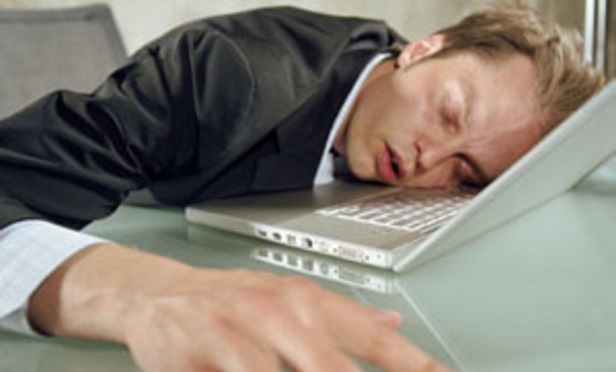 Sleep-deprived employees are less likely to be focused at work, take longer to complete tasks, are less creative and less likely to tackle more mentally involved projects. (Photo: Shutterstock)
Sleep-deprived employees are less likely to be focused at work, take longer to complete tasks, are less creative and less likely to tackle more mentally involved projects. (Photo: Shutterstock)
Over the past 25 years, increased technology and longer work hours has blurred the separation between our personal and professional lives.
With the spread of COVID-19, it's much more likely that you and your employees will be working remotely — making the separation between your work and home life much muddier. An employer's role in supporting stress resiliency through daily self-care practices and good sleep habits is more important than ever before.
Related: Remote work: 7 ways to help employees adjust to the new normal's new workplace
According to a Gallup study, Americans get just 6.8 hours of sleep each night on average. This compares to 7.9 hours 50 years ago. That hour less of sleep each night may not seem significant, but, according to Dr. Matthew Walker, author of Why We Sleep, "Getting seven hours of sleep for 10 nights in a row is the equivalent of staying up for 24 hours."
Beyond physical benefits, research by RAND Corporation shared, "If everyone in the U.S. slept one more hour each night, we would boost the economy by $226.4 billion."
Sleep-deprived employees cause a range of issues. Sleep-deprived employees are less likely to be focused at work, take longer to complete tasks, are less creative and less likely to tackle more mentally involved projects. They're also more likely to make costly mistakes and have trouble retaining new information.
Add in the additional distractions of working from home for the first time, with a partner, and potentially kids and stress, presenteeism, and absenteeism is bound to increase.
According to Walter F. Stewart, a director of the Center for Health Research & Rural Advocacy at Geisinger Health System in Danville, Pennsylvania, presenteeism in the United States costs employers more than $150 billion per year.
Underslept employees are also more likely to suffer from anxiety and depression, burnout, and lifestyle diseases such as diabetes, heart disease, Alzheimer's and cancer. They're less likely to be physically active and more likely to gain weight due to suppressed hormones that regulate their ability to feel full when eating.
Sleep-deprived employees are 40 percent more likely to react negatively to stressful situations due to a disconnect between their logical and emotional brains. An equilibrium that can only be rebalanced with a good night of sleep
- Employers' role in supporting healthy habits
Sustained, work-related stress is one of the primary causes of increased anxiety and depression — and unsurprisingly sleep-deprivation.
Without proper support or guidance from employers, loyal employees working from home are bound to double-down on their work hours at the expense of their mental or physical health by cutting into their daily wellness routines or sleep practices.
Employers should encourage their employees to incorporate wellness habits throughout the day.
One of the best ways to do this is to get rid of the outdated notion that wellness activities should be off-limits during a traditional workday.
Instead, companies can encourage employees to increase their stress resiliency by supporting self-care practices like taking lunch breaks and multiple short, brisk walks to boost energy, initiating a daily mediation practice or gratitude journal, supporting lunchtime workouts, staying connected via Zoom and phone calls, and helping to create a clearer separation of work and home-life.
This will help to reduce the impact stress has on their employees' sleep cycles. In turn, they'll have higher functioning, healthier employees during work hours — whether they're working remotely or in the office.
Employers can also promote good sleep habits by providing or suggesting:
- Brighter workspaces during the day
- Alternatives to soda or coffee to help employees limit afternoon caffeine intake
- Policies that discourage sending work emails after 7 pm
- Screenings for sleep apnea
- Medical coverage for therapists to help address anxiety and depression
Some companies are even creating nap rooms, or encouraging afternoon naps, to help boost productivity after research by NASA showed that a 20-minute nap significantly increases cognitive function and improved performance by 34 percent.
Small, simple changes in how companies support their employees' ability to handle constant connectivity and related stress will not only significantly improve their employees' health, but generate significant financial gains for employers and our economy, which is important during these unprecedented times.
Brianna Harrington is founder of Seek United.
Read more:
© 2025 ALM Global, LLC, All Rights Reserved. Request academic re-use from www.copyright.com. All other uses, submit a request to [email protected]. For more information visit Asset & Logo Licensing.







